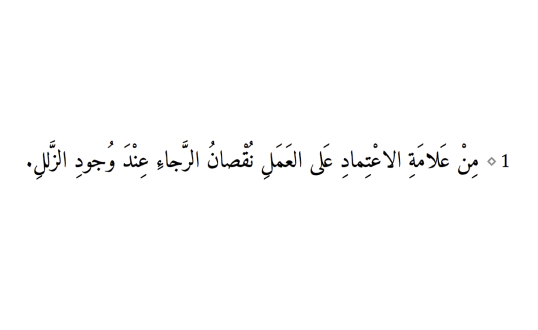Ibn Ata’illah al-Iskandari (d.709H/1309CE) is best known in the Muslim world for his slim anthology of spiritual aphorisms known as Kitab al-Hikam, or Hikam al-Ata’iyyah. The Hikam’s enduring appeal and popularity, among scholars and layman alike, lies in its ability to convey Islam’s spiritual truths with beauty, brevity, energy of expression and layers of meaning. What follows is the first aphorism in the collection, along with a brief commentary:
1. One of the signs of relying upon one’s deeds is the loss of hope when a slip occurs.
♦
1 – A sure proof of being mislead into believing that it is our good deeds which bring us closer to Allah, rather than His unmitigated grace and pure generosity, is a loss of hope when a sin occurs. This, as masters of the inner life point out, is a lesser form of idolatry (shirk). Shaykh Muhammad Hayat al-Sindhi (d.1163H/1750CE) stated: ‘In this dependance is a branch of shirk that negates the perfection of tawhid.‘1 How so? For it reflects an unhealthy attachment on our part to deeds and their outcomes more than to the Creator of such deeds and His mercy and plenitude.
2 – This aphorism helps us to realise that we do not reach Allah through good deeds, but rather through His enabling grace (tawfiq), which allows us to do good: And Allah created you and what you do. [37:96] There is also this authentic hadith: ‘None of you will enter Paradise due to your deeds.’ They said: Not even you, O Allah’s Messenger? He ﷺ said: ‘Not even me; unless Allah covers me in His kindness and mercy.’2 In this realisation, then, lie the soul’s repose and the removal of the layered profanities of our own selfhood. For how can we harbour pretensions of righteousness when righteous accomplishments are not of our own doing, but are gifts from God? It’s only when we fail to see this reality do we then start to see works of faith as being of our own doing; and thus begin to be vain, conceited and bask in our own self-glory.
3 – Al-Shurnubi (d.1348H/1929CE) spells out: ‘The author’s aim in this aphorism is to arouse the seeker (salik) to diligently perform good deeds, whilst elevating his concern above relying on them, but instead to rely purely on the grace of [Allah] the Possessor of Majesty and Honour … His intent isn’t to instruct people to leave-off doing acts of worship.’3
4 – At this point, the more informed among us may point out the verse: Enter Paradise because of what you used to do, [16:32] and well ask how it squares with the above cited hadith? And it’s a good question that warrants pause for thought. Al-Shurnubi’s reply to it puts to rest any lingering pretensions as he explains ‘that deeds will not be given any consideration unless they are acceptable (maqbul); and their acceptance is purely by divine grace. Thus it is sound [to assert] that entry into Paradise is purely by Allah’s kindness, while actions are a cause of one’s level in it.’4
5 – As for the ‘arifun – the ‘knowers’ of Allah; the true people of tawhid – they do not increase in hope by doing acts of good; for they are flooded with the intensification of perception, in that they experience all good as originating solely from God’s grace and boundless generosity; this includes their own acts of obedience too. ‘Their hopes do not deepen because of doing good deeds, in as much as they do not see themselves as the [actual] doers. Nor do their hopes in Allah’s mercy diminish if they fall short in an act of obedience or commit a slip. For they are immersed in the seas of contentment with the Divine Decree.’5
6 – The above degree of faith is an extraordinary one indeed. It is the station of those who worship Allah kannaka tarah – ‘as though seeing Him’ – as one celebrated hadith tells us.6 Most of us would be kidding ourselves if we thought we were at such a lofty degree of tawhid and awareness of the Divine Presence. Realistically, for us it’s more a case of what al-Shurnubi stresses next: ‘As for the seekers, it behoves them to delight in their righteous deeds and prioritise the required fear, due to the lessening of hope, when a slip occurs – as per the words of Imam al-Dardir: “Let your fear dominate over your hope/and travel to your Lord with straying (wa ghallibi’l-khawfa ‘ala raja’i/wa sir li mawlaka bila tana’i).” This is so, especially in our times when religiosity has weakened, sins have proliferated and trustworthiness has all but been lost.’7
7 – A final point that this aphorism points to is that sins must never lead to despair. In a state of sin, we must train our hearts to turn their gaze away from our [sinful] deeds to the mercy of Allah: Say: ‘O My servants who have transgressed against their own souls! Despair not of Allah’s mercy! Allah forgives all sins; He is Forgiving, Compassionate.’ [39:53] Al-Sindhi states that: ‘The ‘arif’s gaze is on his Lord, not on his deeds.’8 We, too, must try and learn to do the same.
♦
To summarise: The above aphorism offers us two invaluable lessons: (i) To realise that we do not reach Allah by our works of faith, but by His grace and acceptance of them. Simply put, salvation is through God’s grace, not our deeds. (ii) To train our hearts to see what comes from Allah to us, more than what goes from us to Him.
Wa’Llahu wali al-tawfiq.
≈
1. Al-Sindhi, Sharh al-Hikam al-Ata’iyyah (Beirut: Dar Maktabah al-Ma‘arif, 2010), 17.
2. Al-Bukhari, no.6103; Muslim, no.2816.
3. Al-Shurnubi, Sharh Hikam al-Imam Ibn Ata’illah (Beirut: Dar Ibn Kathir, 2008), 65.
4. ibid., 66.
5. ibid., 64.
6. Muslim, no.80.
7. Al-Shurnubi, Sharh al-Hikam, 64.
8. Al-Sindhi, Sharh al-Hikam, 17.
reblogged from The Humble “I“
Categories: Islam

Please leave a Reply